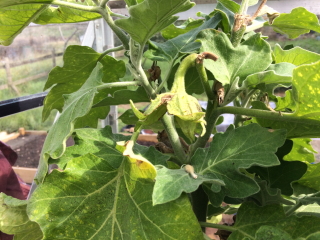Our first "full time" season of vegetable gardening for some years was admittedly trial and error. We relied on a combination of old experience (rusty, like a lot of our ill maintained equipment) and advice found on line from the RHS and many very enthusiastic and apparently organised and successful allotment owners.
So how did we do? Unsurprisingly we had mixed results but none of our crops completely failed.
We planted the squashes at the recommended spacing but later decided they were too close together. Because of the drought from June through to end of July they needed watering everyday so the plant pots we sank in besides each plant helped. The patty pans started well but we lost about half the later fruits when the weather turned wet and they rotted on the stem. We think it was "blossom end rot" but the leaves also developed some type of grey mould infection, which we seemed to contain by thinning out the plants and relieving the overcrowding. The butternuts survived better but several of them succumbed to the same type of rot. Next year we will plant fewer plants further apart.
Our biggest disaster was the fennel. They looked great to begin with and we were banking them up but the bulbs didn't swell, then they bolted and we abandoned them. Prior to that we had harvested a couple but they were very tough. But all was not lost. We diced them very finely in the food processor, freeze dried them in the refrigerator and then ground them into power which we used as quite an effective flavouring.
Beetroots were successful but smaller than we expected. Delicious and now we are pickling the excess. The kale was struck by caterpillars and in the early season we were left with leaves full of holes and stalks, but later they recovered and we now have an excellent crop. We haven't harvested the corn, it was just about ripe when it was flattened in a recent storm. We will try it in the next few days.
Dwarf french beans were prolific and didn't appear to suffer from any insects, disease or other ailment. These must have been the easiest thing we grew, but we don't know the variety as we purchased them from our village shop as seedlings. The broad beans started well and we got a good first harvest but the later flowers didn't set and some of the leaves started to curl, so the yield was disappointingly low. We checked them for aphids and other pests but could find nothing. There were plenty of bees in and out of the flowers so we think they were pollinated. Maybe we didn't water them enough or they were affected by the storm which blew down the runner beans.
We grew peas in tubs and they cropped heavily. The nasturtiums planted along side appeared to distract the caterpillars, and although they seemed to have been completely devoured by mid August they are now growing strongly once again. Lovely red, orange and yellow flowers too. I'll definitely be sowing more of them next year.
The runner beans started slowly but eventually did well until unfortunately the frame they were climbing was blown down in a sudden severe storm at the end of July. Some of the plants were damaged by the storm, others were damaged when we attempt to repair the frame but enough survived and they continued to provide beans until the end of September although some of them but not all suffered from some sort of leaf curl. We couldn't see any insect infestation on them. We gathered our final harvest in early October.
Apples and pears - we did nothing extra this year but like everyone else we have had a bumper crop and the house is now full of pears in syrup, apple and pear jams, pickled apples and multiple chutneys.

The other greenhouse plants: tomatoes, sweet peppers and hot chillies cropped heavily but the chilli leaves did turn yellow and fall early. On some of the plants it reduced the harvest. We think we may have got the watering wrong and we were certainly inconsistent as the guidance and advice we found was often contradictory. Salad leaves and herbs did well but the first batch of radishes were small and misshapen. The second batch were sown with larger spacing and did well. Very tasty.
So what did we learn? We need to learn to recognise the various pests - they aren't all as easy to identify as aphids - and react faster when we first detect problems. We possibly overcrowded the greenhouse, so next year we will give the plants more space. Keep on top of harvesting. The raspberry canes have provided a huge number of berries but we left many to shed and we will be tackling a new forest of canes next year - they spread like weeds and can out compete the brambles and nettles.
Talking of brambles we have a superb hedge row of wild blackberry brambles, nice sunny spot, huge delicious berries. Occasionally they need cutting back -but they are the lucky ones. Usually we are in full scale war against brambles.




